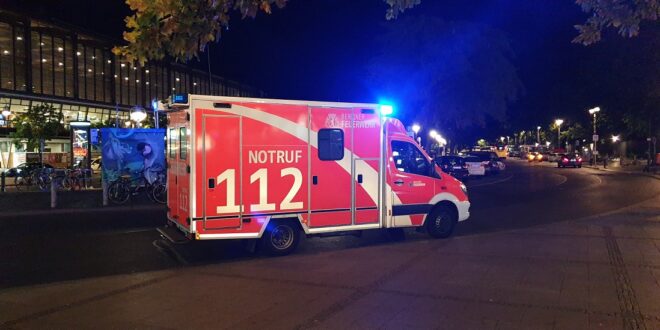Germany’s Minister of the Interior, Nancy Faeser, has called for quick sentences of perpetrators of the New Year’s Eve riots in several German cities, including Berlin, Hamburg, Bonn, Dortmund and Essen.
During a visit to a fire station in the Berlin district of Neukölln on Friday, Ms Faeser said juvenile offenders should immediately feel a quick legal consequence of their actions and be made to realise that the state was capable of acting.
She also spoke out in favour of improved social work in day-care centres and schools.
Faeser visited the Neukölln fire station with the Governing Mayor of Berlin, Franziska Giffey, and spoke with emergency personnel who were on duty on New Year’s Eve. Faeser called it a “disgusting kind of criminality” by young people when, for example, firefighters were lured into an ambush.
Regarding the debate on failed integration biographies, Faeser said that it must be addressed. “It would not be right to conceal the migration background of perpetrators,” she said. “But it would also be wrong to misuse this for political discussions.”
Germans have expressed outrage following the New Year’s Eve rioting and attacks on emergency personnel in Berlin and other cities. There were reports of rockets, firecrackers and even a starting pistol being fired at emergency vehicles. Forty-one police officers were hurt in Berlin alone, according to media reports.
The majority of the 145 people detained during the Berlin riots, according to the police, were men. Of those detained, 45 were German nationals (mostly of foreign origin), 27 were of Afghan nationality and 21 were Syrians. Leading conservative politician Jens Spahn blamed unregulated migration and poor integration for the riots, sparking a larger discussion.
Meanwhile, an organisation of journalists with a migration background has criticised the German media for the way they are reporting on the incidents.
“We observe with concern how much force the reporting on New Year’s Eve has intensified, with journalistic due diligence sometimes falling by the wayside. The tendency to focus on the (alleged) origin of the perpetrators or their parents fuels prejudices, prevents a proper analysis and obscures the view of possible solutions,” the New German Media Practitioners (Neuen deutschen Medienmacher*innen e.V.) said in a press statement, warning against stigmatisation.
“Of course, the events of New Year’s Eve must be reported and their causes researched. In doing so, allegations and conclusions should be covered by a secure data basis and not be based on speculation,” the organisation said.
“A (supposed) ‘migration background’ as an explanation for crimes or problems leads to the false conclusion of ethnicising crime. In most cases, other factors are decisive, such as age, gender, economic situation, social milieus in which people with a migration history are statistically more strongly represented. If in big cities half of the young men have a so-called migration background and the incidents are predominantly started by young men, it is hardly surprising that among the perpetrators there are often people who are read as migrants. To omit these contexts is a violation of journalistic due diligence.”
Sola Jolaoso
 THE AFRICAN COURIER. Reporting Africa and its Diaspora! The African Courier is an international magazine published in Germany to report on Africa and the Diaspora African experience. The first issue of the bimonthly magazine appeared on the newsstands on 15 February 1998. The African Courier is a communication forum for European-African political, economic and cultural exchanges, and a voice for Africa in Europe.
THE AFRICAN COURIER. Reporting Africa and its Diaspora! The African Courier is an international magazine published in Germany to report on Africa and the Diaspora African experience. The first issue of the bimonthly magazine appeared on the newsstands on 15 February 1998. The African Courier is a communication forum for European-African political, economic and cultural exchanges, and a voice for Africa in Europe.


































